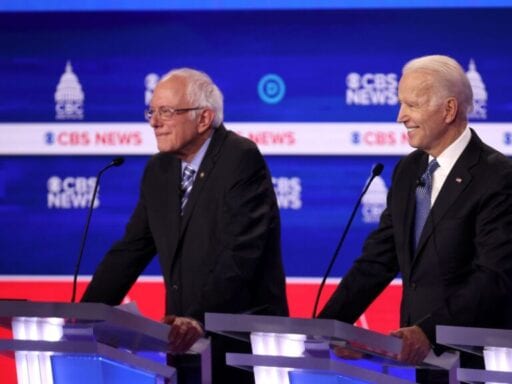Joe Biden and Bernie Sanders face off directly for the first time.
This Sunday’s debate could be the last one to take place before the Democratic presidential nomination is all but decided.
The debate, which will not have a studio audience given concerns about the novel coronavirus, will air on CNN, Univision, and CNN.com from 8 pm to 10 pm ET. It will be hosted at CNN’s studios in Washington, DC, and will be moderated by the network’s Jake Tapper and Dana Bash, and Univision’s Ilia Calderón.
Since February, the Democratic primary has become a two-person race between former Vice President Joe Biden and Sen. Bernie Sanders, and the two will finally go head-to-head.
It’s likely the last chance for Sanders to make his case; as Vox’s Andrew Prokop has written, Sanders still has a narrow path forward — but his opportunity to seize it is rapidly winnowing. Because there are fewer delegates available as the race progresses, Sanders needs to make gains earlier on in the primary in order to build up his support.
The debate is also taking place as the country reels from an outbreak of coronavirus cases, and grapples with ongoing questions about access to tests and information on how to combat illness. Previously scheduled to take place in Phoenix, Arizona, ahead of the state’s primary, the debate’s location was changed in response to the latest developments related to the virus.
“Out of an abundance of caution and in order to reduce cross-country travel, all parties have decided that the best path forward is to hold Sunday’s debate at CNN’s studio in Washington, D.C., with no live audience,” Democratic National Committee Xochitl Hinojosa said in a statement.
The threshold to qualify for this debate is, once again, higher than past debates. Candidates needed to earn 20 percent or more of the delegates that have been allocated so far in order to make the stage. It’s a requirement that means Rep. Tulsi Gabbard, who is technically still in the race, won’t be able to participate. (There had been speculation about whether Gabbard could also qualify, given the two pledged delegates that she picked up on Super Tuesday from American Samoa, a metric that would have qualified her for earlier debates.)
Instead, Sunday will be a head-to-head matchup, the first — and possibly last — of the 2020 campaign.
The state of the race, briefly explained
Biden is on a hot streak: Biden has had a pretty great couple of weeks, and the wins he secured last Tuesday don’t bode well for Sanders. In addition to picking up 10 states on Super Tuesday, Biden won Michigan, Missouri, and Mississippi on March 10, all by sizable margins. According to our delegate tracker, Biden now has 864 delegates to Sanders’s 705.
Since candidates need at least 1,991 delegates to win the Democratic nomination outright, Biden probably won’t be able to do it for some time — but Sanders is running out of chances to stymie his gains. According to Politico, the former Vice President has signaled that he’ll lean into the consolidation of other former 2020 Democrats behind his candidacy, citing how lawmakers have united behind him.
Sanders has limited opportunity to make up ground: Since the list of primaries left is growing shorter, Sanders would need to pull in a strong showing in many of the states coming up, in order to make up for his delegate deficits. As Prokop noted, there are just fewer chances to catch up down the line: “After this Tuesday’s primary, just 53 percent of delegates remain. After next Tuesday, March 17, just 38.5 percent will be left.”
This debate marks a major chance for him to try to appeal to voters in upcoming states including Arizona, Florida, Illinois and Ohio, all of which are expected to be tough gets. Staffers told Politico he’ll emphasize his leadership on policy, including Medicare-for-all.
The novel coronavirus presents a specific challenge: The debate will also be taking against the backdrop of a coronavirus outbreak in the US, of which there were roughly 1,300 confirmed cases in the US as of March 13, according to Johns Hopkins University.
Sanders and Biden have laid out plans of their own to tackle the crisis, both of which have offered a stark contrast to the measures that Trump has taken so far. Their plans include free testing for individuals who are both insured and uninsured, as well as unemployment assistance to Americans whose jobs are affected by the response to the virus.
Author: Li Zhou
Read More



